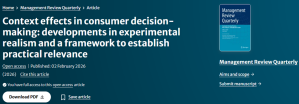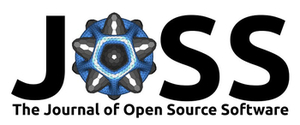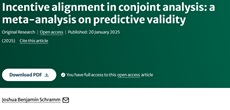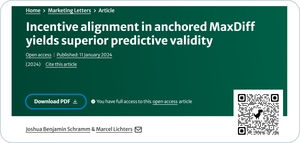News: Forschung
Check out our new publication on context effects‘ practical relevance
How much can you trust context effects in product choice to hold in practice? The confidence in the generalizability of context effects research to real-world scenarios largely depends on the realism of consumer research study settings. Our team member Felix sheds light on the development of experimental realism through more than 40 years of context effects research.
Context effects are choice phenomena that show that our consumer decisions are not as stable as we think. However, there has been criticism that academic research investigates these effects in artificial ways, yielding insights of low practical value.
Felix’s literature review, published in Management Review Quarterly, analyzed 460 individual context effect investigations and assessed their extent of realism, which can crucially influence study conclusions. Overall, there is a positive development over time, but there is still room for improvement. However, the level of generalizability varies strongly across context effects: Especially popular ones, such as the attraction and compromise effects, have been demonstrated repeatedly even in real-world settings.
The article also provides a framework for designing realistic studies with practical relevance. Practitioners can also use this framework as an evaluation tool when reading research on context effects.
You are warmly invited to read this open-access article to dive deeper into the world of context effects (research).
Check out our new Food Quality and Preference publication on how to make plant-based meat alternatives more appealing
Check out our latest publication published in Food Quality and Preference
Plant-based meat alternatives (PBMA), you might like them or not, significantly help reach greenhouse gas emission targets. But how can the attractiveness of PBMA products be increased for consumers? This question is essential for retailers, manufacturers, and governmental decision-makers.
Examining the UK market for PBMA burger patties, Paul Naughton (Edinburgh Napier University), Joshua Schramm, and Marcel Lichters have uncovered promising insights. Their study, recently published in Food Quality and Preference, delves into the role of effective front-of-pack labelling strategies, offering a beacon of hope for the future of sustainable food options.
Our findings:
- Consumers can be grouped into 3 distinct segments in terms of preference for front-of-pack labels: (1) nutritious information, (2) ecological information, (3) taste information
- Price plays the most significant role for consumers when deciding between PBMA or meat products; however ...
- Highlighting taste via an accredited taste label can enhance PBMA’s appeal and convince consumers to switch from meat alternatives to PBMA
These findings underscore the practical implications of the right labeling strategy in promoting sustainable food consumption. The article also equips you with valuable information on segment profiles in the UK and the potential impact of different labels on willingness to pay.
We would happily evaluate similar questions for retailers or manufacturers operating in other countries. You can find the article for free here.
Thanks to Otto von Guericke University Magdeburg (Part of the EU Green Alliance) for supporting the open-access publication.
New R package published in the Journal of Open Source Software
The other form of open science service to the market research community!
Check out our new R package published in The Journal of Open Source Software.
In recent years, during discussions with specific small and medium-sized market research providers and marketing departments, we observed that studies on preference elicitation through Conjoint analysis or (anchored) Maximum Difference Scaling (MaxDiff) rarely include measures to assess the predictive (out-of-calibration) validity in holdout tasks to ensure data quality in managerial decision-making.
The reasons for this neglect may be manifold:
- Functions for implementing and validating holdout tasks are often not fully integrated into commercial software solutions that handle Conjoint and MaxDiff studies.
- A lack of time in the fast-paced market research industry
- Insufficient training for participating market research managers
- Ultimately, professional online panel providers have no incentive to address previously unmentioned data quality issues.
Our new R package validateHOT comes into play (see GitHub for tutorials).
Beginning with a few functions we provided to our students during Conjoint seminars at the Otto von Guericke University Magdeburg, we have now consolidated several functions into a package that offers tools for validating holdout tasks and preparing basic market simulations, among other features. The package also helps with Total-Unduplicated-Reach-and-Frequency (T.U.R.F) analysis. It integrates seamlessly with (Adaptive) Choice-based Conjoint or MaxDiff as conducted by popular proprietary packages commonly used by companies.
Curious? Check out the open-access publication for free by following this link.
We wish you all some happy coding
A new meta-analysis published in Marketing Letters
Have you ever wondered whether incentive alignment in conjoint analysis is worth the additional costs? Based on our latest meta-analysis, we would say … yes, it is!
Conjoint analyses are often conducted in hypothetical settings where participants are not sufficiently motivated to invest the same mental effort as in an actual purchase situation. This can lead to significant losses and missed opportunities for companies relying on the resultant biased preferences. One effective workaround is to apply incentive alignment.
Our recent meta-analysis, published in Marketing Letters with 12,980 participants, shows that incentive-aligning conjoint analysis increases the prediction accuracy of consumer choices by 12%.
In the meta-analysis, we also find that incentive alignment is more effective for durable and service goods (compared to FMCGs) and when applied with adaptive choice-based conjoint analysis. The latter mirrors our recent findings from a JAMS article.
Our meta-analysis concludes with practical guidelines for market researchers. These include a detailed discussion on the cost implications of incentive-aligning a conjoint analysis, providing valuable insights and equipping researchers with the necessary knowledge for those considering this approach.
We warmly invite you to explore our open-access article, which comprehensively overviews our research findings. This is your chance to enjoy the article for free and delve deeper into the world of incentive alignment in conjoint analysis.
New open-access article published in Marketing Letters
Ever thought about anchored MaxDiff for product choice predictions in market research? If not, it is high time to do so.
Anchored MaxDiff upgrades traditional MaxDiff by also measuring the outside good’s utility (i.e., the no-buy alternative), which converts relative MaxDiff scores into absolute ones that can also be compared between respondents.
Our recent research published in Marketing Letters investigated in a 2 (direct anchored MaxDiff vs. indirect anchored MaxDiff) x 2 (hypothetical vs. incentive-aligned) online-experiment which method yields the highest predictive validity. We show that both anchoring methods benefit strongly from incentive alignment (similar to other preference measurement techniques, as previously shown in a JAMS article.
We also show that incentive alignment predicts general demand fairly accurately, while hypothetical MaxDiff tends to overestimate demand.
Finally, we take a look at how marketing implications (e.g., product assortment optimizations) may differ between hypothetical and incentive-aligned anchored MaxDiff.
The article provides an overview of anchored MaxDiff and how incentive alignment can now be implemented in a MaxDiff study design.
Enjoy the article for free in Marketing Letters.




